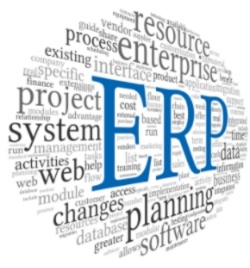 At first glance Enterprise Resource Planning (ERP) might seem like common sense. After all, what firm can afford to plan its resource use poorly? What enterprise has the ability to run its operations from day to day without thinking ahead?
At first glance Enterprise Resource Planning (ERP) might seem like common sense. After all, what firm can afford to plan its resource use poorly? What enterprise has the ability to run its operations from day to day without thinking ahead?
However, ERP is not simply the application of basic common sense to business practices (although that definitely comes into it). It is actually a recognised suite of software tools and processes which, when used together, streamlines corporate systems, focusing employee time and company money where it can generate the greatest return.
A Crucial Tool in Dealing with Complexity
The key focus of a well-designed ERP system is to reduce complexity and allow managers to know exactly what is happening within their organisation. In most cases, as modern firms grow, they become more complex. They spread geographically, adding offices and staff. They add new product lines, which require manufacturing processes and marketing campaigns. And they add new tiers of management to cope with the complexity.
All of this expansion has a cost – which is known as complexity. Left unchecked, company growth can lead to duplicated staff roles, loss of control over staff behaviour, loss of quality control and poor communication – among many potential problems. That’s why successful firms are cautious about growing too fast.
ERP is a vital tool for the firms that are seeking to expand safely. Although their operations and revenues are growing, firms with an ERP strategy in place that works are able to keep their structures free of inefficiency.
What Form Does an ERP System Take?
ERP systems are primarily unifying tools, in that they bring important company processes like manufacturing, marketing, inventory management, personnel, customer relationship management or product research under one umbrella. This takes the form of a unified IT package which can control all of the different processes at once.
Most ERP packages are collections of databases. They store company data as it is created, making it comprehensible for managers and storing it for future use. This data could include anything from the bill of materials to product stocks, unpaid invoices or purchase orders. If it affects the firm’s bottom line, it will be processed under the ERP system.
What Kinds of Firms Use ERP?
Generally speaking, ERP systems have been adopted most rapidly and extensively in the manufacturing sector. It is naturally suited to firms which need to balance the flow of materials with purchase demands and market conditions. This applies even more if the firm in question operates a just-in-time manufacturing strategy along lean manufacturing principles.
However, firms across almost all sectors of the economy have begun to adopt the technology. Any organisation which relies on a combination of processes such as accounting, human resources, sales and marketing can benefit from bringing them all together. This is just as relevant for public sector bodies and charities as small businesses.
The Everyday Experience of ERP systems
If they are implemented in a relevant, skilful fashion, ERP systems will allow all employees to carry out their duties more effectively. Employeeswill have access to real time information about their own department and that of others. They can coordinate more efficiently with each other, as well as with managers. And they can benefit from the data that ERP systems collects to plan their activities.
From a management perspective, ERP should provide a greater awareness of what is going on – in terms of successes and failures. It can highlight areas of waste, and areas where productivity is lagging, and it provides a suite of analytical tools that can identify emerging problems.
That's why companies are turning to ERP implementations like WinMan to rationalise and improve their internal processes.



.png?width=120&height=120&name=MicrosoftTeams-image%20(4).png)


